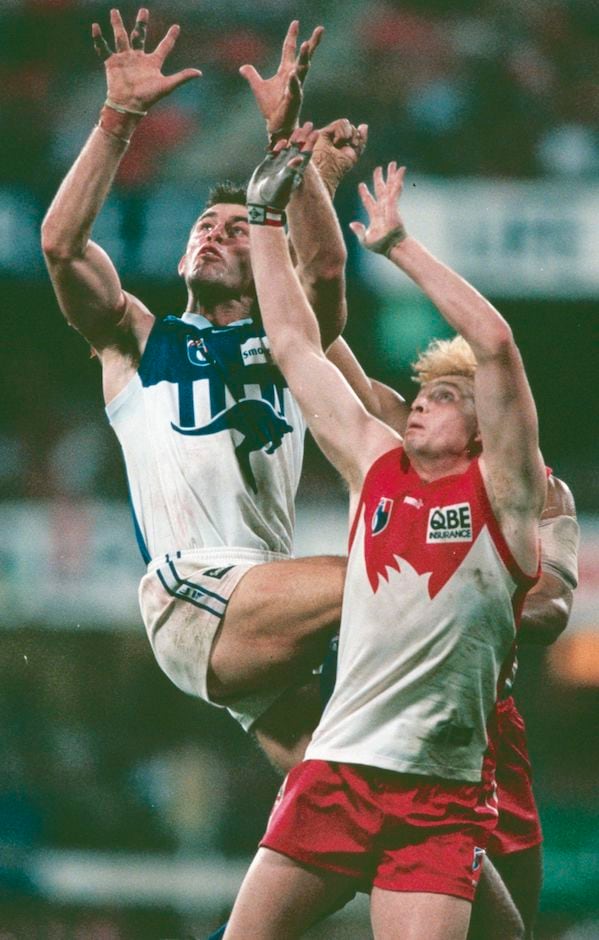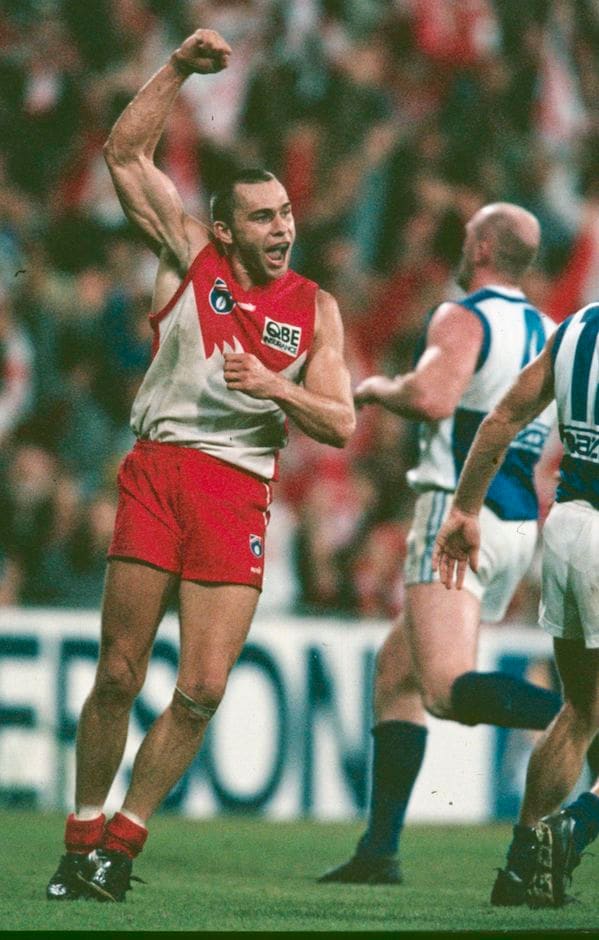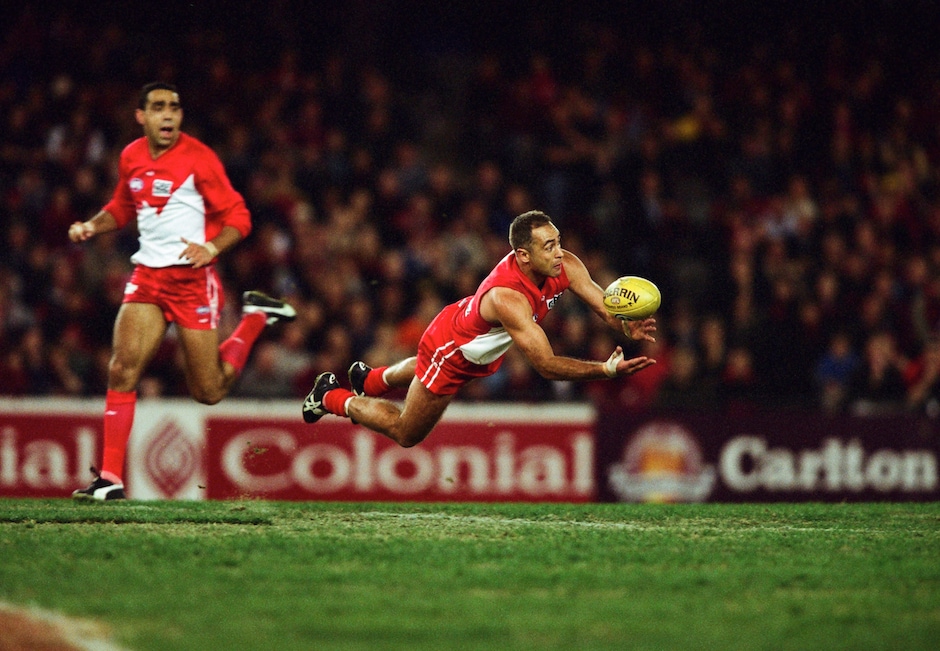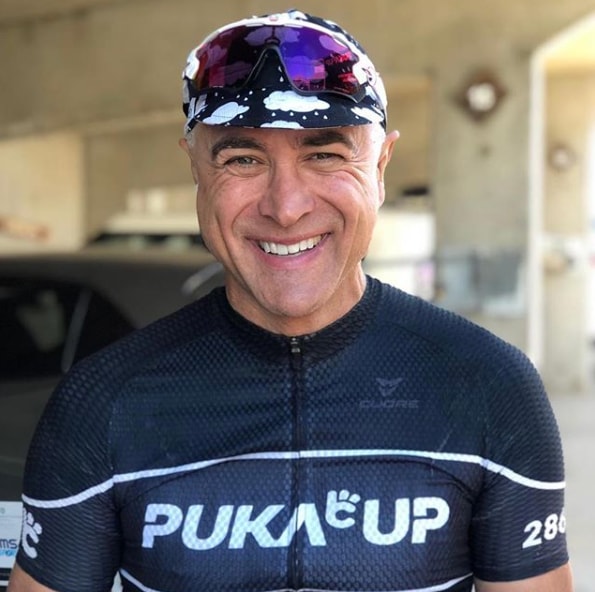In a series new to 2019, we revisit moments in history involving the Sydney Swans’ round-by-round opposition.
History, nostalgia and memories form a special part of what makes Australian rules football great, and we hope the Footy Flashbacks series reignites some of your fondest Swans moments.
In the latest edition, we wind back time to the day the Swans fought back from 48 points down to beat the Kangaroos in “one hell of a grudge match”.
The Sydney Swans were hell-bent on showing the Kangaroos Sydney belonged to them when they arrived at the SCG in Round 4, 1999 – and their intent could not have been clearer before a 29,617-strong crowd.
The team known as the Kangaroos between 1999 and 2007, rather than its traditional 'North Melbourne', would play four 'home' games at the SCG in 1999.
And as Sydney vice-captain Andrew Dunkley told The Daily Telegraph in the lead-up to the clash, the Swans had “done a lot of hard work to cement a following in NSW” since their 1982 relocation from South Melbourne – and the Roos were apparently trying to steal their territory.
The opening half of a game that star Sydney forward Tony Lockett had touted as “one hell of a grudge match” didn’t reflect the Swans’ feelings towards the Roos.
The Victorians were unstoppable en route to six first-term goals to the Swans’ one, before establishing as much as a 48-point lead late in the second quarter.
But in the second half the Swans’ desire for Sydney supremacy would shine through, Rodney Eade’s men surging to seven goals and limiting the Roos to just one to clinch a two-point victory.
Sydney midfielder Wayne Schwass cannot recall specifics of the game, but he said the Swans were fiercely opposed to the Roos' push into Sydney.

The Sydney Swans' Gerrard Bennett flies for the footy.
“I remember disappointment, frustration, I wouldn’t go as far as saying anger, but certainly from the Swans’ point of view, we felt the Kangaroos were trying to encroach on our territory,” Schwass told Swans Media.
“It was our backyard. It was our home territory. We were still trying to establish ourselves as a footy club at that point in time. It was a very different situation compared to the position the club has in the Sydney market now, and we felt very protective of our backyard.
“I can certainly recall conversations and the mood throughout the club, and certainly from an administration point of view, that we didn’t like the fact the Kangaroos were trying to play more games in Sydney. I’d like to say it was personal, and we wanted to do everything to make sure we protected our supporter base and our Sydney market.”
Future Sydney captain Stuart Maxfield gathered 21 disposals and two goals to claim three Brownlow Medal votes in the 10.12 (72) to 10.10 (70) win, with the Swans’ Rowan Warfe (two Brownlow Medal votes) and the Roos’ Peter Bell (one) also among the best.
The second of Maxfield’s goals handed Sydney the lead for the first time in the match with just 68 seconds left on the clock, with the gutsy midfielder threading a six-pointer off his left boot, but it was Sydney skipper Paul Kelly who had stolen the spotlight.
In just his fourth game back from a knee reconstruction, the 1995 Brownlow Medallist produced a miraculous effort to put the Swans within two kicks of the opposition.
Kelly swooped on the footy in the left-forward pocket, shrugged off Martin Pike and Adam Simpson and slotted a right-foot snap to the elated cheers of the crowd, his goal prompting the praise of acclaimed journalist Mike Sheahan.
“He kicked a goal in the last quarter that was a creation of desperation, courage, belief, strength, balance and skill,” Sheahan wrote in the Herald Sun.

Sydney Swans captain Paul Kelly celebrates kicking a tremendous goal.
The Swans’ Daryn Cresswell (37 touches) and Schwass (25 possessions, one goal) produced excellent games of their own, and Sydney’s Wade Chapman celebrated his 50th match.
Not only did the Swans recover from an eight-goal deficit without the man who just six games later would become the greatest goal-kicker in VFL/AFL history, Tony Lockett, they did so without the service of ruckman Greg Stafford for the majority of the game.
The towering Swan finished his day in just the eighth minute of the first term after suffering a serious knee injury, prompting the teenaged Adam Goodes to switch from the forward line to the ruck.
This matched Goodes, who was making just his fourth senior appearance, with 118-gamer Corey McKernan.
Not only was the imposing Roo six centimetres taller and 11 kilograms heavier, he would finish his career as a dual premiership player and an All Australian.

The Sydney Swans' Wayne Schwass dives for the footy in a 2001 clash with Essendon.
“Corey was a very influential player and on his day he was very damaging,” Schwass said.
“He was a ruckman who, when confident, could dominate a game, not only with hit-outs and taps to advantage, but with his ability to clear the contest really well.
“But his ability to influence the game away from the contest was just as good. When he was fit and confident he was a player who would cover the ground really well and quite fast.”
Adding to the theatre of the SCG clash was a ferocious midweek hailstorm.
As Lockett and Michael O’Loughlin were undergoing fitness tests at the Wednesday afternoon training session, the team was forced to run for cover after just 30 minutes as hailstones battered Sydney’s eastern suburbs.
The SCG Trust made desperate calls to other sports arenas in an attempt to have about 2000 seats replaced in time for the Saturday night fixture, while the turf and dozens of windows had also been destroyed.
Schwass can recall the hailstorm in vivid detail.
“The thing that led to the decision for us to get off the training track was lightning, and I can still recall this envelope of colour circling us – and it was at that moment that I think we all realised that this was pretty serious,” Schwass said.
“I don’t think many of us were thinking of our families at home, and it wasn’t until we showered and went out to our cars that we realised the full gravity of the situation. Our windscreens were blown out, there had been panel damage to our cars and it was at that moment that we thought, ‘Those of us who have families at home – I wonder how they’re going’.
“It was a unique experience, I had never been involved in anything like that before and I certainly hope I’m not involved in anything like that again."
Schwass played 282 games for North Melbourne and Sydney in the years spanning 1988-2002.
The New Zealand-born footballer was a member of North Melbourne’s 1996 premiership team, was a dual North Melbourne best-and-fairest winner (1994, 1995), claimed the Swans’ 1999 Club Champion honour and was selected for the 1999 All Australian side.
Many years on, Schwass is the leader of mental-health organisation Puka Up, a social enterprise striving to eliminate suicide.
“It’s never been more important to put some really hard work into the mental-health space,” Schwass said.
“We need to come up with creative ways that prevent people from getting into crisis. The number of people taking their lives, the number of people attempting to take their lives and the number of people living with conditions like depression and anxiety is continuing to increase. So we’ve got to come up with new ways of approaching the same issue.”
Cycling is central to Schwass’ mental health.
He cycles about 200 kilometres a week during winter and anywhere between 300 and 500 kilometres a week in summer, and he says “my life would be very different without it”.

There's very little the Wayne Schwass of today enjoys more than riding his bike.
“I’m obsessed with cycling,” Schwass said.
“It’s my form of exercise and meditation. It’s a sport I’ve absolutely fallen in love with. It helps me physically, it helps me mentally and it’s something I do for my emotional wellbeing. I love the solitude of a solo ride, but I also love the camaraderie, spirit and connection of a group ride. Cycling is a massive part of my life.”
Away from work and his bike, Schwass and his wife Rachel are raising three children in Victoria’s Macedon Ranges: 15-year-old twins Indigo and Tameka, and 12-year-old son Kai.
Schwass’ life is now very different from when he was donning Roos and Swans colours, but he says he’ll always keep a close eye on the two clubs.
“I want both clubs to be successful.”




